The Kashmir Great Lakes Trek offers a surreal experience, highlighting some of India’s most captivating landscapes. This journey takes you through a series of seven stunning high-altitude lakes, with each one surpass beauty of the last. Located in the heart of the Himalayas, this route covers a distance of 72 kilometers and typically requires 7 to 9 days to finish. It presents trekkers with a remarkable chance to engage with pristine nature, magnificent views, and a rich cultural legacy.
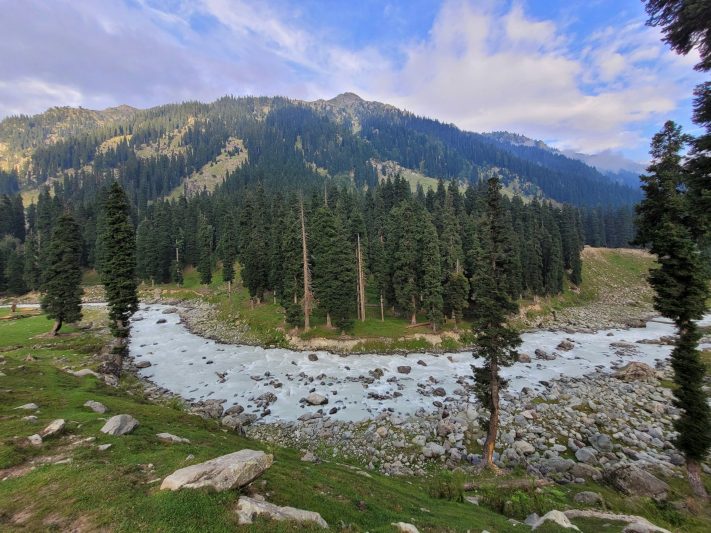
Highlights of the Stunning Natural Beauty
As you set out on this hike, prepare to be immersed in a world of unparalleled natural beauty. Picture yourself surrounded by rolling meadows teeming with colorful blooms and pristine glacial lakes that mirror the towering, snow-dusted peaks. Every footstep on this trail unfolds like a masterpiece of nature. Standout attractions include the peaceful Dal Lake, the radiant Vishansar Lake, and the charming twin lakes of Nundkol and Gangbal, each boasting its own distinctive charm. These lakes offer endless opportunities to snap breathtaking photos and bask in moments of serene introspection.
Challenges and Rewards of the Trek
The Kashmir Great Lakes Trek is a highly gratifying experience, but it comes with its fair share of obstacles. The route features demanding inclines and declines, lofty mountain passes, and mercurial weather patterns. To tackle these hurdles, trekkers must possess a high level of physical stamina and mental resilience. Nevertheless, the overwhelming sense of pride and the breathtaking vistas that await around every bend render the hard work thoroughly rewarding. Additionally, the trek offers a chance to break free from the monotony of daily routine and forge a deeper connection with the natural world.
When should you go on this trek?
As you prepare for the Kashmir Great Lakes trek, it’s essential to consider the timing of your expedition. The trail is accessible from June to September, a period characterized by ideal weather conditions, making it the prime season for this adventure. During this time, the lakes are at their most majestic state. Alternatively, some trekkers prefer to embark on this journey towards the end of November, when the landscape is set ablaze by autumn colors and blanketed with a layer of snow.
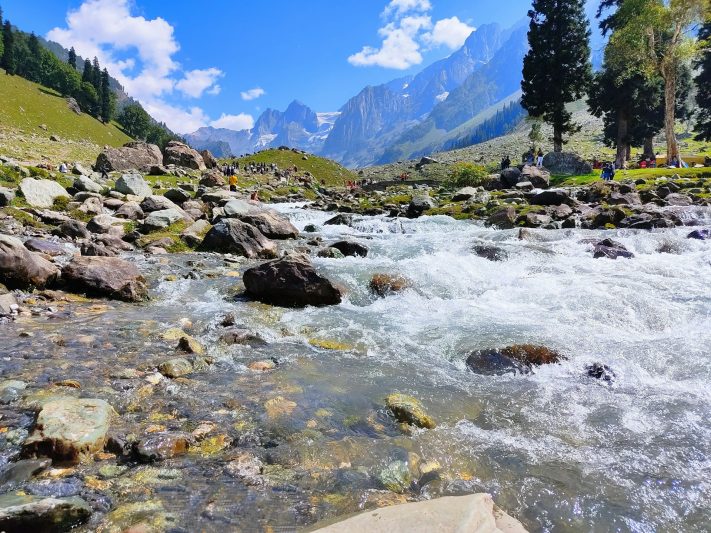
Preparing for the Adventure
Essential Gear and Equipment
Embarking on the Kashmir Great Lakes Trek requires proper preparation to ensure a safe and enjoyable experience. Essential gear includes:
- Backpack: A comfortable, durable backpack with a capacity of 50-60 liters.
- Clothing: Layered clothing system including moisture-wicking base layers, insulating mid-layers, and waterproof outer layers.
- Footwear: Sturdy, waterproof trekking boots with good ankle support.
- Sleeping gear: A high-quality sleeping bag rated for temperatures around -5°C to -10°C and a lightweight sleeping mat.
- Trekking poles: Helpful for balance and reducing strain on your knees during steep ascents and descents.
- Hydration system: Water bottles or a hydration bladder with a minimum capacity of 2 liters, along with water purification tablets.
- First aid kit: A basic first aid kit including bandages, antiseptic wipes, pain relief medication, and any personal medications.
- Sunscreen and sunglasses: High SPF sunscreen and UV-protective sunglasses to protect against harsh sun exposure at high altitudes.
Physical and Mental Preparation
The Kashmir Great Lakes Trek is physically demanding, so adequate preparation is key. Here are some tips:
- Cardio training: Engage in regular cardiovascular exercises like running, cycling, or swimming to build stamina.
- Strength training: Focus on leg and core exercises, such as squats and planks, to enhance muscle endurance.
- Flexibility exercises: Incorporate stretching routines and yoga to improve flexibility and reduce the risk of injury.
- Mental resilience: Practice mindfulness and stress management techniques to stay mentally strong during challenging sections of the trek.
Permits and Local Guides
Acquiring the required licenses and employing the services of local experts is vital for a trouble-free hiking adventure. It’s recommended to procure these licenses from the regional governing bodies well ahead of time to avoid last-minute hassles. Engaging the services of a well-versed local guide not only boosts safety but also adds depth to your expedition by providing valuable information about the region’s customs, past, and scenic attractions. Furthermore, local guides possess intimate knowledge of the landscape, enabling them to expertly steer you through difficult passages.
To access in-depth information on required permits and the services of local experts, visit the official websites of tourism boards or reach out to reputable trekking operators in the area.
Short Itinerary: Kashmir Great Lakes Trek
Day 1
Start your drive from Srinagar to the Shitkari’s base camp. It is a 3-4 hour drive with breathtaking views keeping you company. You can camp here overnight.
Day 2
Start your trek to Nichnai Pass, 13 km away from the base camp in 7-8 hours.
Day 3
Start your trek to the stunning Vishansar Lake from Nichnai Pass and camp there overnight.
Day 4
It is a rest day, also letting you get acclimatized to the high altitudes of Srinagar. After rest, hike towards Kishansar Lake and then back to Vishansar Lake. With the weather conditions optimal, you will move ahead to the Nandkoi campsite.
Day 5
From here, you start your trek to Gadsar through Gadsar Pass. It will take 7-8 hours and a few more km towards the camping ground.
Day 6
Head towards Megandob via the Satsar Lake trail and enjoy the beautiful views.
Day 7
Head to Nundkol Lake and enjoy the views of Gangabal lake and head back to the camp.
Day 8
Head to Naranag and start your drive to Srinagar.
The Trekking Experience
Detailed Route Description
Undertaking the Kashmir Great Lakes Trek is an unforgettable adventure. This incredible journey begins in Sonamarg, a picturesque hill station nestled in Kashmir’s breathtaking landscape. Over the course of 72 kilometers, you’ll wind your way through vibrant green meadows, dense woodlands, and steep mountain trails.
A notable stop along the way is Nichnai, where many trekkers rest for the night. From there, the path rises to the tranquil Vishansar Lake, surrounded by towering mountain peaks. The trek’s highest point, the Gadsar Pass, standing at an impressive 13,750 feet, offers awe-inspiring vistas that leave a lasting impression.
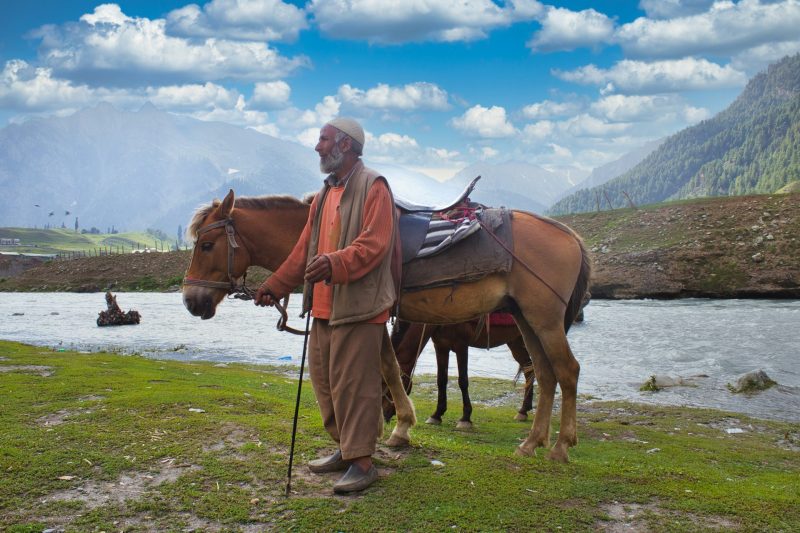
Scenic Highlights and Camping Spots
Every day along the trail offers its distinct and picturesque attractions. The Kishansar and Gadsar lakes stand out for their pristine waters, making them ideal spots for camping. Here, hikers can pitch their tents and immerse in the peacefulness of the outdoors. Another notable feature is the Satsar Lake, a collection of seven interconnected lakes. The journey culminates at Naranag, following a passage through the captivating Gangbal Twin Lakes.
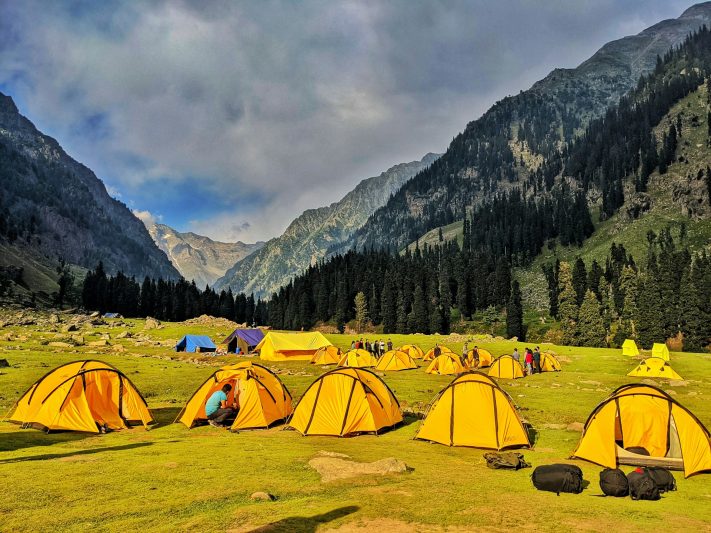
Wildlife and Flora Encounters
The Kashmir Great Lakes area boasts a diverse range of plant and animal species. During your trek, you might come across various wildlife such as the Himalayan marmot, ibex, and if you’re fortunate, the rare snow leopard! The landscape is also striking, with meadows filled with vibrant wildflowers like blue poppies and daisies. This part of the trek is more than just a thrilling experience – it’s a profound exploration of Kashmir’s stunning natural beauty. Every step uncovers a fresh view, making the effort completely rewarding.
Cultural Immersion
Interaction with Local Communities
The Kashmir Great Lakes Trek provides a valuable chance to engage with the indigenous communities living in the area. While exploring the picturesque landscapes, you will come across Gujjar Bakarwal shepherds who have been residing in these regions for generations, coexisting harmoniously with the environment. Connecting with them allows you to learn about their distinct lifestyle, traditional, and longstanding traditions.
Interactions with residents frequently include discussions on their everyday activities, methods of raising animals, and stories about the mountains. These exchanges offer hikers a deeper insight into the community’s social structure and its close relationship with the environment.
Exploring Traditional Kashmiri Cuisine
Fully immersing yourself in a culture must include enjoying the authentic local food. While exploring, you may encounter chances to sample classic Kashmiri meals such as Rogan Josh, Yakhni, and Dum Aloo. The local cuisine is known for its flavorful profile and the incorporation of fragrant spices such as saffron, cardamom, and cloves.
Take advantage of the opportunity to share a meal with a local family or visit a rustic shepherd’s hut, and be sure to sample the traditional Kahwa tea, a soothing blend of green tea, saffron, almonds, and aromatic spices. This comforting drink is just what you need to revitalize after a grueling day of hiking.
Understanding the Region’s Rich History
Kashmir’s rich cultural heritage is as striking as its breathtaking scenery. For thousands of years, this region has been a vibrant fusion of diverse influences, shaped by the convergence of Buddhist, Hindu, and Islamic customs. As you explore the terrain, you’ll stumble upon centuries-old relics, including sacred shrines, temples, and mosques, which whisper tales of the region’s storied past.
Local experts and residents frequently regale visitors with captivating tales of Kashmir’s former monarchs, the ancient Silk Road commerce, and the cross-cultural interchange that have molded the region into its present form. By grasping this rich historical background, hikers can transform their trek into a multidimensional experience, elevating it from a mere traversal of breathtaking landscapes to a poignant stroll through the annals of time.
Responsible Trekking
Importance of Sustainable Tourism
Preserving the untouched scenery and cultural history of the Kashmir Great Lakes area relies on sustainable tourism. It is up to us, as hikers, to guarantee that our travel is mindful of the surroundings and the people living there. By embracing eco-friendly methods, we can help maintain the charm of these paths and contribute to the well-being of the local residents.
Leave No Trace Principles
The Leave No Trace principles are a set of guidelines that help minimize our impact on nature. Here’s a quick rundown:
- Plan Ahead and Prepare: Research the trail and be ready for any conditions.
- Travel and Camp on Durable Surfaces: Stick to established trails and campsites to avoid trampling native vegetation.
- Dispose of Waste Properly: Pack out all trash, leftover food, and litter.
- Leave What You Find: Preserve the past; leave rocks, plants, and other natural objects as you find them.
- Minimize Campfire Impact: Use a lightweight stove for cooking and enjoy a candle lantern instead of a fire.
- Respect Wildlife: Observe animals from a distance and never feed them.
- Be Considerate of Other Visitors: Respect other trekkers and the quality of their experience.
Minimizing Environmental Impact
To further reduce our footprint:
- Use Eco-Friendly Gear: Opt for reusable water bottles and biodegradable soaps.
- Support Local Vendors: Buy local produce and handmade items to support the community economy.
- Educate Fellow Trekkers: Share knowledge about sustainable practices with others.
By adhering to these principles, we contribute to the conservation of the Kashmir Great Lakes region, ensuring it remains a trekker’s paradise for generations to come. “`
Conclusion and Final Thoughts
Reflections on the Life-Changing Experience
The Kashmir Great Lakes Trek is a transformative experience that goes beyond a mere hike, fundamentally altering one’s outlook on life. As you make your way across the majestic terrain, navigating the seven glacial lakes and overcoming the rugged landscape, you’ll find yourself deeply connected to your inner self and the world around you. With every step, from lush meadows to towering summits, you’ll discover valuable life lessons in perseverance, adaptability, and the beauty of living simply.
Future Trekking Plans and Recommendations
If the allure of the Kashmir Great Lakes Trek has sparked your interest, why not venture forth to discover more breathtaking trails in the area? The Tarsar Marsar Trek and Markha Valley Trek are standout options that promise distinctive scenery and immersive cultural encounters. To guarantee a successful and enjoyable journey, be sure to plan meticulously and show reverence for the pristine natural surroundings.
Inspiration for Adventure Seekers
If this journey has sparked a thirst for exploration, don’t let the excitement fade. The globe is teeming with awe-inspiring routes that remain unexplored. Spanning from the majestic Annapurna Circuit in Nepal to the historic Inca Trail in Peru, every trail boasts its unique blend of obstacles and triumphs.



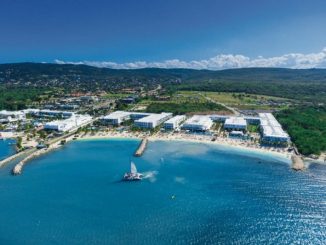
I’m glad to hear that you share the same love for Kashmir as I do! It truly is a paradise on earth with its breathtaking landscapes and serene beauty. How wonderful that you have had the opportunity to visit Kashmir three times already. I hope each visit brought you joy and unforgettable memories. The treks in Kashmir are indeed a fantastic way to explore and immerse oneself in the region’s natural wonders. Thank you for your kind words, and may you have many more amazing experiences in Kashmir!
Kashmir is the paradise om earth. It is also my favorite place. I visited Kashmir 3 times. Thank you for sharing beautiful information on Treks in Kashmir.